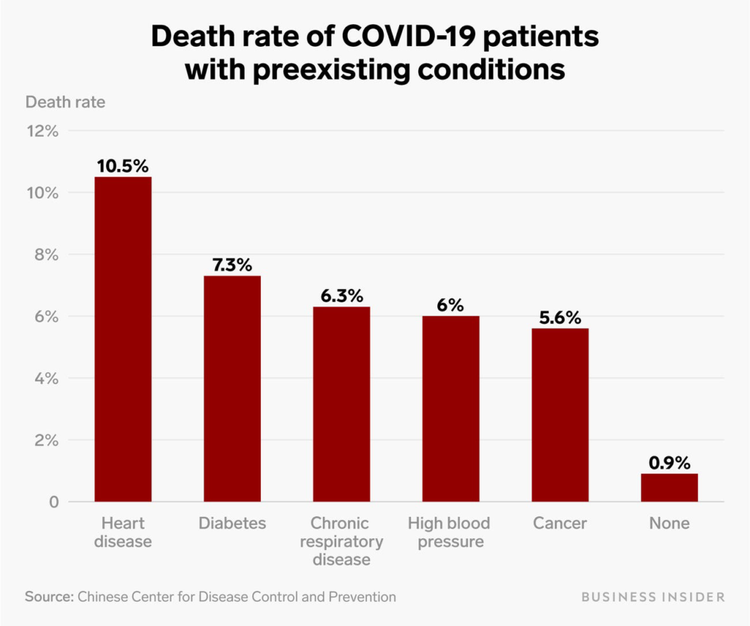Emerging from COVID-19 has been a rollercoaster— with challenges, anxiety, and, for some, lasting trauma. In this recovery period, we can glean invaluable insights from our collective experience with the pandemic.
A key takeaway: the imperative of nurturing healthy habits to prevent disease.
As highlighted in a 2021 Yale Medicine article, our healthcare paradigm has shifted. Instead of addressing the consequences of illnesses at advanced stages, we must focus on a predictive and holistic system, anticipating health threats before they escalate.
Safeguarding Against Pre-Existing Conditions
We saw individuals with pre-existing health conditions face elevated risks in the context of COVID-19. Chronic lung ailments, cardiovascular disorders, severe obesity, diabetes—the CDC identifies these among the factors contributing to heightened COVID mortality rates.
Even early in the pandemic, researchers from the Chinese Center for Disease Control and Prevention conducted a study with over 44,000 COVID-19 patients and found a disproportionate impact on those with underlying health issues. Alarmingly, the mortality rate surges to as high as 10.5% for individuals with heart disease.

Preventing Conditions With Healthy Changes
The silver lining lies in the preventability of many of these conditions through positive lifestyle changes. Consider the following statistics:
- It’s estimated that 80% of cardiovascular disease cases, including heart disease and stroke, could be prevented.
- About 90% of type 2 diabetes cases could be prevented.
- Approximately 75% of COPD cases are caused by smoking cigarettes —and could be prevented by quitting (or not smoking in the first place).
So, rather than waiting for a pandemic and scrambling to find a solution, it’s time to work preventatively and focus on wellness. If we could prevent even a small fraction of these diseases, patients could be at lower risk for future complications and enjoy a better quality of life overall.
Using Exercise and Nutrition for Prevention
Regular exercise keeps us healthy and plays a role in preventing pre-existing conditions. Some medical professionals say staying active can also reduce the risk of hospitalization and complications from illnesses like COVID-19.
The Role of Exercise in Protection from Illness
Dr. Wes Smith, the Chair of the Undergraduate Exercise Physiology Program and the Director of the Graduate Program in Nutrition and Human Performance at the University of Miami, explains,
“Exercise produces an enzyme that can defend the lungs from inflammation-induced oxidative stress, which may be the major cause of COVID-19 mortality. This is great news for people exercising daily since this may help maintain high levels of antioxidant protection in the lungs, kidneys, and other major organs.”
The Role of Nutrition in Protection from Illness
Nutrition has also been linked directly to lower rates of hospitalization for diseases like COVID-19. What we eat impacts our immune systems. For example, this study found that the DASH Eating Plan was associated with a lower risk of hospitalization due to COVID-19.
Related Post: Explaining Functional Nutrition
Another study from physicians from the Cleveland Clinic Center for Functional Medicine and the Friedman School of Nutrition Science and Policy at Tufts University examined patients who recovered at home versus those who needed hospitalization.
One major factor keeping patients out of the hospital was metabolic health. “Only about 12 percent of Americans are metabolically healthy, without a large waist, high blood pressure, high blood sugar, or high cholesterol,” The physicians explained. “The major driver of poor metabolic health, which increases the risk of hospitalization and death from COVID-19, is the nation’s diet.”
The SENS Solution: Improving Sleep, Exercise, Nutrition, and Stress Management
Personalized, preventative care and a deep relationship between physician and patient are what concierge medicine is all about. And at CCPHP, we have a particular focus on wellness.
Our SENS Solution® Wellness program provides all of our doctors and their members with ongoing wellness support in the areas of sleep, exercise, nutrition, and stress management and offers personalized health coaching to help our Members meet their individual health goals.
Related Post: Understanding the SENS Solution Wellness Program
Wellness programs and health coaching programs like this have proven significant results. One study shows that in 6 months or less, 89% of participants met at least one health coaching goal.
In combination with a smaller patient panel, these wellness and coaching programs give physicians in CCPHP membership-based practices both the time and health coaching support to better protect their patients from chronic diseases—which in turn helps to improve their resilience against new infectious diseases.
A Focus on Preventative Care
Preventative care is the cornerstone of maintaining optimal health and well-being, particularly in preventing the onset and progression of chronic diseases.
Chronic diseases, such as diabetes, heart disease, and certain cancers, are among the leading causes of morbidity and mortality worldwide. As we know, these conditions are preventable or manageable through early detection, lifestyle modifications, and targeted interventions.
Preventative Measures Offered by Concierge Physicians
1. Comprehensive health assessments: With more time spent with each patient, concierge physicians can conduct thorough health assessments. This includes medical history reviews, physical examinations, and screenings for various health indicators. These assessments help identify early warning signs of potential chronic diseases and allow for timely interventions.
2. Lifestyle counseling: Lifestyle factors such as diet, exercise, stress management, and sleep patterns play a significant role in preventing chronic diseases. Through the SENS Solution Wellness program, members adopt healthy habits and mitigate risk factors.
3. Risk stratification: With an extensive physician network, CCPHPC physicians can offer specialist referrals to determine individual susceptibility to cardiovascular disease, cancer, and neurodegenerative disorders. This information enables proactive measures to minimize risk and enhance early detection.
4. Connectivity and appointment times: CCPHP Members can expect same or next-day appointments, so when they’re concerned about a potential chronic issue, they won’t need to wait months for a doctor’s visit and can catch issues before they develop.
24/7 access to their doctor means they can easily ask questions or express concerns about any conditions and get advice from their physician.
5. Continuity of care: Preventative care is not a one-time event but rather a continuum of proactive measures. Concierge physicians establish long-term relationships with their members and closely monitor their health status over time.Related Post: What Is Continuity of Care?
Preventing Illness With Concierge Care
Now, more than ever is the time for all to be taking care of themselves by focusing on preventative care.
You and your patients can not only prevent complications from infectious diseases like COVID-19 but also prevent many other insidious diseases facing our populations and reducing our quality of life.
Everyone can make measurable progress by improving habits surrounding sleep, exercise, nutrition, and stress management. And a personalized health coaching program can help everyone stay accountable.


